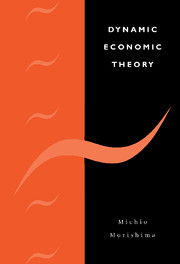Book contents
- Frontmatter
- Contents
- Preface
- 1 The method of dynamic analysis
- 2 Households' and firms' economic behaviour
- 3 Stability conditions for a temporary equilibrium: the linear case
- 4 Stability conditions for a temporary equilibrium: the non-linear case
- 5 Comparative dynamics
- Appendices
- Mathematical notes
- ADDENDUM
- References
- Index
1 - The method of dynamic analysis
Published online by Cambridge University Press: 08 February 2010
- Frontmatter
- Contents
- Preface
- 1 The method of dynamic analysis
- 2 Households' and firms' economic behaviour
- 3 Stability conditions for a temporary equilibrium: the linear case
- 4 Stability conditions for a temporary equilibrium: the non-linear case
- 5 Comparative dynamics
- Appendices
- Mathematical notes
- ADDENDUM
- References
- Index
Summary
Dynamic economic theory
What subjects should economics be concerned with and what should be their scope? These are very difficult problems which invite many controversies; but, still, it is true that economics ultimately aims to explain all economic phenomena. Such an aim determines how economics is to be constructed. Those phenomena which economics assumes without analysis must not be economic phenomena but are ones which should be elucidated by other disciplines. It is obvious that if economics assumes an economic fact without examination, its aim, which is to deal with all economic phenomena, will never be satisfied. Thinking in this way, those economists who supported general equilibrium theory finally dug their way into a non-economic world on which economic phenomena are finally based. When successful in the business of reducing economic relationships to non-economic ones they think that they have obtained the ultimate principles of explanation and they call those non-economic phenomena by the descriptions of the data that economists take as given. Individuals' tastes, techniques of production, endowments of factors of production, prevailing expectations about the future, and various institutions will be counted as data.
Thus, the general equilibrium theory which analyses economic phenomena on the basis of a given data complex naturally pursues the question of how economic phenomena will change if there is a change in the given data complex. That is to say that general equilibrium theory is concerned with correspondences between data and economic phenomena.
Information
- Type
- Chapter
- Information
- Dynamic Economic Theory , pp. 1 - 8Publisher: Cambridge University PressPrint publication year: 1996
